AC Acting Up? Your Guide to Diagnosing and Fixing Common Problems


AC Acting Up? Your Guide to Diagnosing and Fixing Common Problems
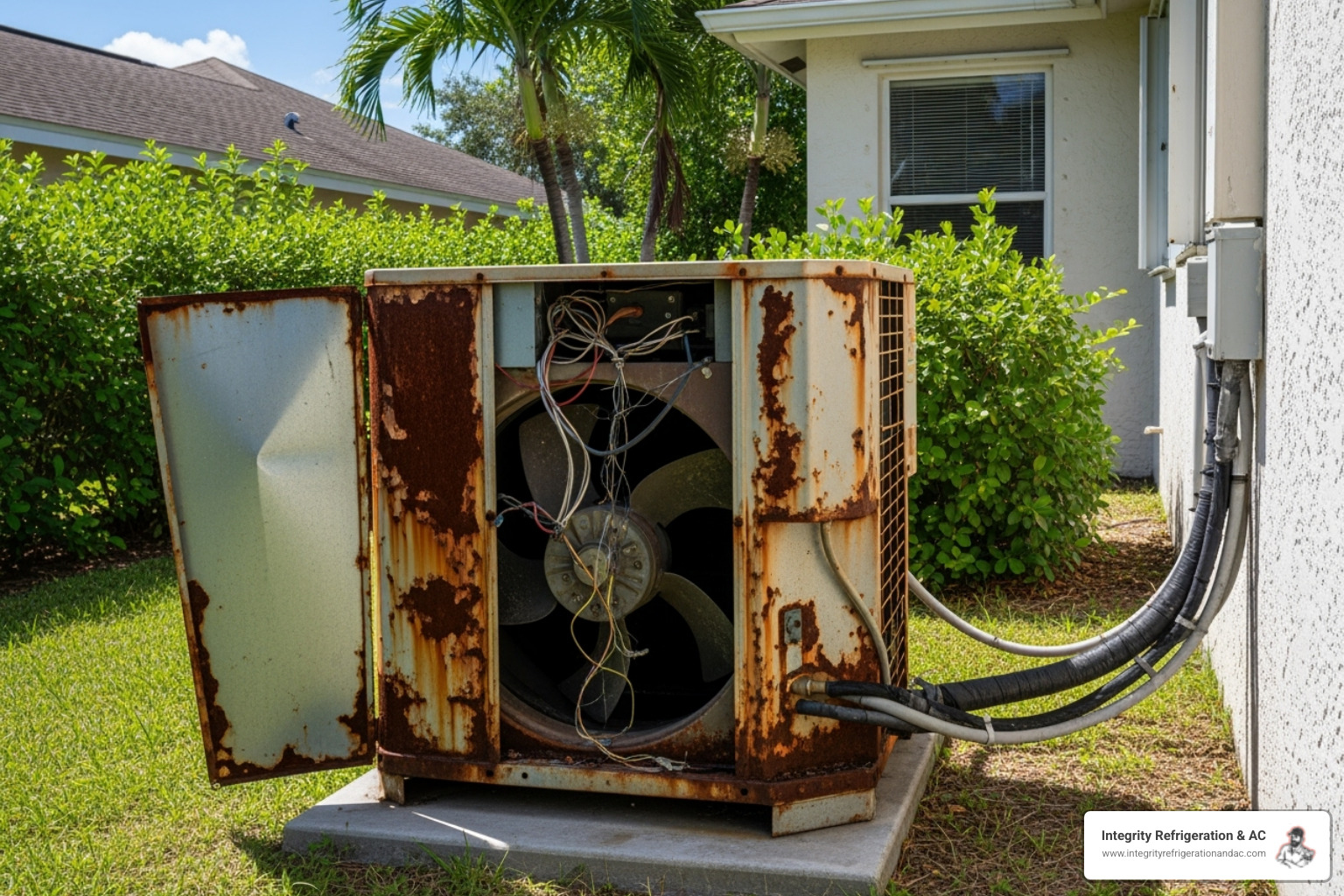
When Your AC Unit Stops Working: Quick Solutions for Florida Heat
A broken AC unit can turn your Florida home into an unbearable sauna in minutes. When temperatures soar and your cooling system fails, you need answers fast.
Most Common Signs Your AC is Broken:
- No cool air - The unit runs but blows warm or room temperature air.
- Strange noises - You hear grinding, squealing, or clicking sounds.
- Water leaks - There's moisture around the indoor unit or stains outside.
- Bad smells - Musty odors or burning scents come from the vents.
- High energy bills - Electricity costs spike without increased usage.
The good news? Many AC problems have simple fixes. According to HVAC experts, nine times out of ten, central air units that aren't working well are caused by a dirty filter - something you can check in under five minutes.
However, some issues require immediate professional attention. If you smell gas, see sparks, or notice ice on your outdoor unit, turn off your system right away and contact a qualified technician.
Don't let a broken AC unit leave you sweating through another Florida summer. The key is knowing what to check first and when it's time to call in the experts.
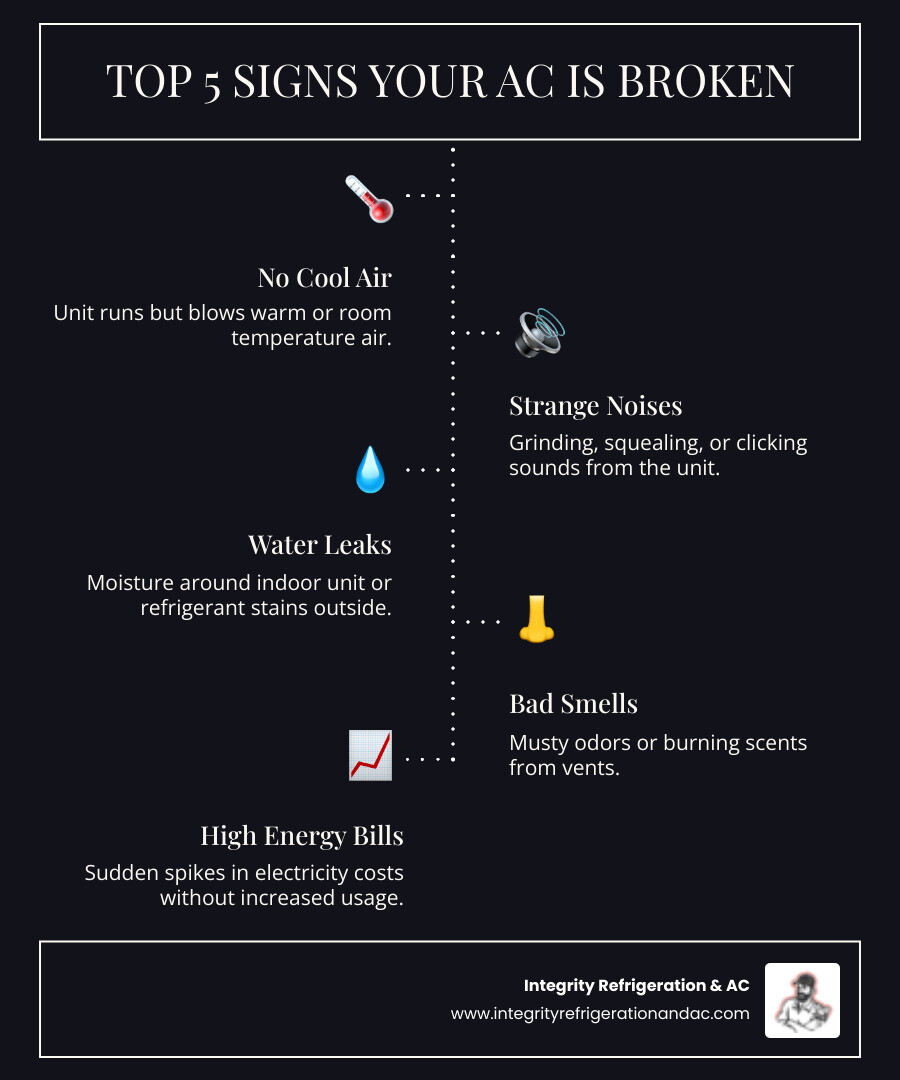
Is Your AC Broken? 9 Telltale Signs to Watch For
Your home should be your cool refuge from Florida's relentless heat. When something's not right with your air conditioning, your system often gives you warning signs before it completely fails. Recognizing these red flags can save you from a complete breakdown and potentially save you money by catching problems early.
Most broken AC unit situations don't happen overnight. Let's walk through the most common signs that your AC needs attention.
Your AC is Making Strange Noises
Your air conditioner should hum quietly, not make sounds that grab your attention. When your unit starts making unusual noises, it's time to investigate.
Grinding or squealing sounds are particularly concerning, often pointing to motor problems like worn-out bearings or a failing belt. Continuing to run the system with these sounds can lead to more expensive repairs.
Persistent humming from your outdoor unit could signal low refrigerant levels, which can permanently damage your compressor—the heart of your cooling system.
Continuous clicking is another red flag. While a single click at startup is normal, ongoing clicking often means trouble with your thermostat or the outdoor unit's contactor. A faulty contactor can't deliver proper voltage to your compressor and fan motor, causing the system to struggle or fail to start.
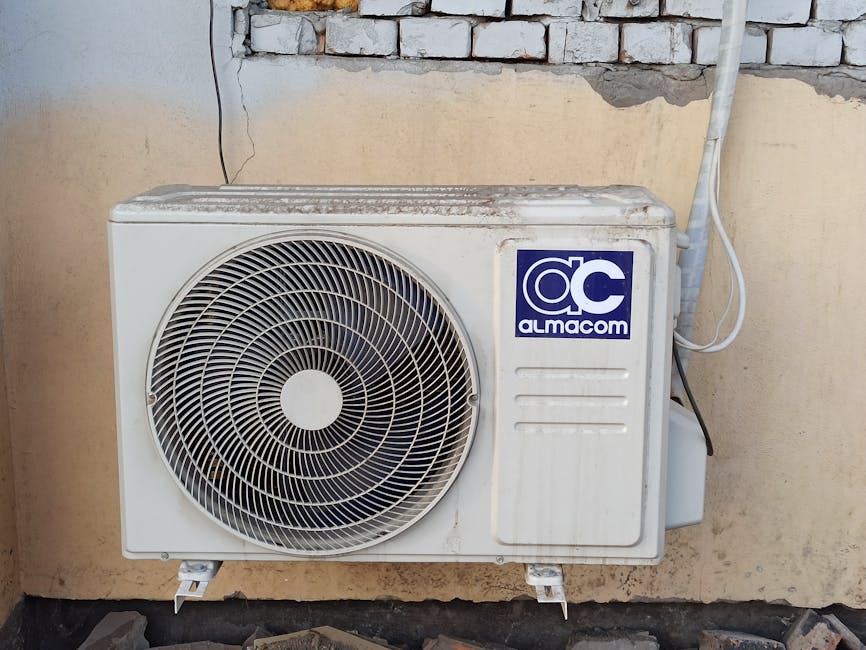
Your Unit is Leaking Water or Refrigerant
Finding puddles around your AC unit is never a good sign. While some condensation is normal, active leaks mean your system needs help fast.
Water pooling around your indoor unit usually points to a clogged condensate drain line. When this drain gets blocked with dirt or algae, water backs up into your home, potentially damaging ceilings and walls.
Brightly colored, oily stains near your unit are telltale signs of a refrigerant leak. Your AC system is a closed loop and should never "use up" refrigerant. If levels are low, there's a leak. A refrigerant leak not only reduces cooling but can also cause your evaporator coil to freeze, making repairs more complex and costly.
For more insights into these common problems, check out our detailed guide on Common AC Problems and How AC Repair Services Can Fix Them.
Beyond these major warnings, a broken AC unit might also show symptoms like weak airflow, high humidity, frequent cycling, spikes in energy bills, or thermostat problems. Catching these signs early gives you options. If you're seeing multiple warning signs, our article on Common Signs You Should Hire an Expert for AC Repair can help you decide when to call the professionals.
First Steps for a Broken AC Unit: DIY Troubleshooting
When your AC fails during a Florida heatwave, your first instinct might be to call for help. But before you do, several simple troubleshooting steps could get your cooling back on track in minutes. Many homeowners are surprised to learn that what seems like a broken AC unit often has a simple fix.
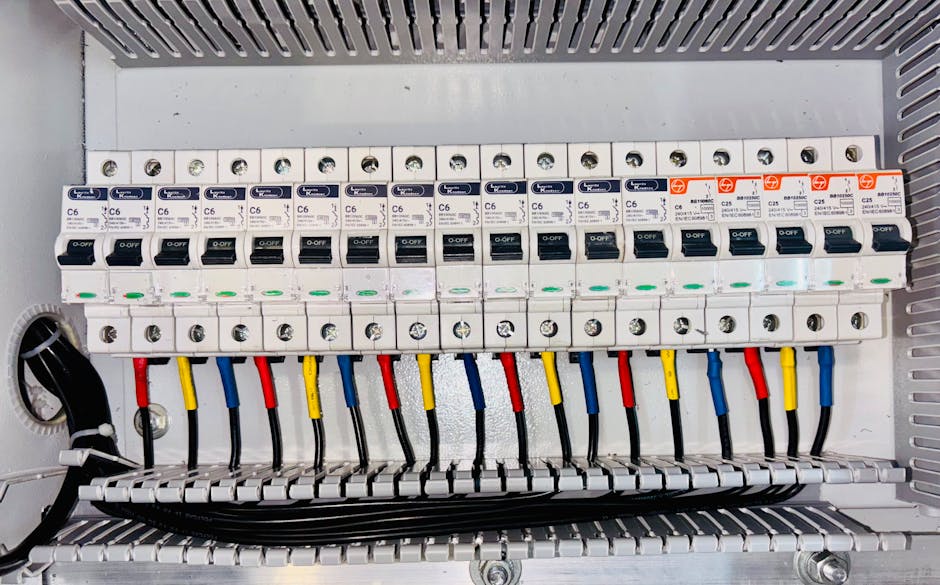
Check the Simple Stuff First
Taking a calm, systematic approach can often reveal the culprit quickly, saving you time and money. Work through this basic checklist:
- Thermostat Settings: Make sure it's set to "COOL" and the temperature is lower than the current room temperature. Check the batteries if it's a battery-powered model.
- Power Supply: Head to your electrical panel and look for the breaker labeled "AC" or "HVAC." If it's tripped, flip it completely off, then back on. If it trips again immediately, stop and call a professional, as this indicates a serious electrical issue.
- Vents and Obstructions: Walk through your home and ensure all supply and return vents are open and clear of furniture or other blockages.
- Furnace Door Panel: The access panel on your indoor unit must be properly secured, or a safety switch will shut down the entire system.
- Outdoor Unit: Clear away any leaves, grass clippings, or overgrown plants. Your condenser needs at least 2-3 feet of clearance on all sides to work properly.
The Number One Culprit: A Dirty Air Filter
When we get service calls about poor cooling, nine times out of ten, the problem is a dirty air filter. This inexpensive component causes more AC headaches than any other single issue.
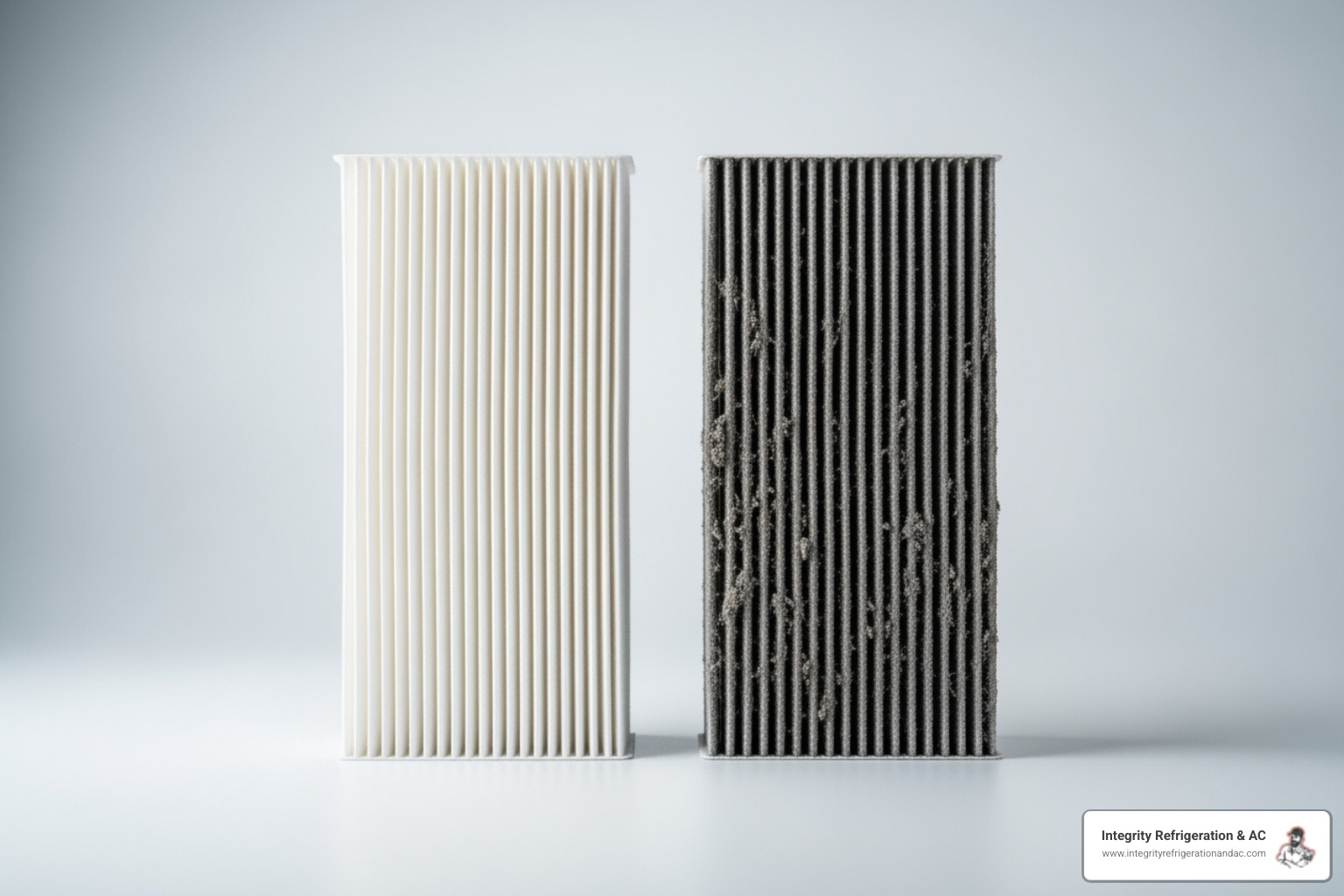
When the filter gets clogged with dust and debris, your system can't breathe. This restricted airflow can cause your evaporator coil to get too cold and freeze solid. No air can get past this block of ice, meaning no cool air reaches your home. Meanwhile, your AC is working overtime trying to cool your home, driving up your energy bills while delivering zero comfort.
Checking your filter takes less than five minutes. Find it, pull it out, and hold it up to a light. If you can't see light passing through, it's time for a replacement. In Florida's climate, most filters need changing every 1-3 months. If you have pets or allergies, you might need to change it more frequently.
If a new filter solves the problem, you've just fixed your broken AC unit yourself! If not, you've eliminated the most common cause and can confidently call for professional help.
Understanding the Problem: Common Causes of AC Failure
When your broken AC unit leaves you sweating, it's natural to wonder what went wrong. While dirty filters are a top cause, several other components can fail and bring your cooling to a halt. Understanding these common failures can help you spot trouble early.
Common Causes of a Broken AC Unit
Most AC failures stem from a handful of usual suspects:
- Electrical Components: Your capacitor provides the jolt to start your motors. When it fails, you might hear the outdoor unit hum, but the fan won't spin. The contactor is an electrical switch that can become burnt or pitted, preventing the system from running consistently.
- Refrigerant Leaks: Your AC is a closed-loop system and shouldn't lose refrigerant. A leak reduces cooling, forces the unit to work harder, and can lead to a frozen evaporator coil or permanent compressor damage.
- Clogged Drain Line: Your AC removes humidity, and that water has to drain. If the line gets blocked, water backs up and a safety switch will shut down the system to prevent water damage.
- Dirty Condenser Coils: The coils on your outdoor unit release heat. When they're dirty, your system works harder, uses more energy, and can overheat and shut down on hot days.
- Frozen Evaporator Coil: This can be caused by a dirty filter, low refrigerant, or a failing blower motor. When the indoor coil ices over, it blocks airflow, and your system will run without producing any cool air.
For more detailed information specific to our Florida climate, check out our guide on Reasons Why You Need AC Repair in Winter Haven, FL.
How Regular Maintenance Prevents Breakdowns
The good news is that most of these problems are preventable. Your AC needs annual tune-ups to stay healthy and avoid unexpected breakdowns, just like your car needs oil changes.
During a maintenance visit, a technician will clean coils, check refrigerant levels, and inspect electrical components like capacitors and contactors, often replacing them before they fail. This proactive approach keeps energy bills down and extends your equipment's life.
An investment in regular maintenance pays for itself in reliability and efficiency. Continuing to run a broken AC unit with underlying problems only makes things worse and more expensive to fix. Taking care of small problems early prevents them from becoming major system failures.
AC Repair vs. Replacement: Making the Smart Choice
When your broken AC unit has you facing a big decision, it's important to know your options. The choice between repairing and replacing can save or cost you thousands. Here are some clear guidelines to help you decide.
| Factor | Repair | Replacement |
|---|---|---|
| Age of Unit | Generally preferred for units under 10 years old. | Often recommended for units over 10-15 years old. |
| Cost of Repair | Cost-effective for minor issues or inexpensive parts. | More cost-effective if repair costs exceed 50% of new unit. |
| Energy Efficiency | Maintains current efficiency (which might be low). | Significantly improves efficiency, leading to lower bills. |
| SEER Rating | No change to existing SEER rating. | Access to higher SEER ratings (16+), greater savings. |
| Refrigerant Type | May use older, phased-out R-22, which is expensive to refill. | Uses newer, environmentally friendly, and cheaper refrigerants (e.g., R-410A). |
| Warranty | Repair typically has limited warranty on part/labor. | New unit comes with full manufacturer's warranty. |
| Frequency of Repairs | Ideal for a single, isolated incident. | Recommended if unit needs frequent repairs. |
| Future Reliability | Less predictable, more prone to future breakdowns. | High reliability, peace of mind for years. |
For a comprehensive look at this important choice, we've put together a detailed guide on AC Repair vs. Replacement: Making the Right Decision.
When to Repair Your Air Conditioner
Repairing your current unit is often the smart move. Repair makes sense for minor issues like a clogged drain line, a failed capacitor, or dirty coils. If your AC is under 10 years old, a breakdown is often just a single component failure, not a system-wide problem.
A good guideline is the 50% rule: if the repair cost is less than half the price of a new unit, repair usually wins. This is especially true if this is the first major issue on an otherwise reliable system.
Deciding What to Do with Your Broken AC Unit
Sometimes, your broken AC unit is telling you it's time to retire. We use the 5,000 rule to help decide: multiply your system's age by the estimated repair cost. If that number exceeds 5,000, replacement usually makes more financial sense.
Frequent repairs are another red flag. If you're calling for service multiple times a season, those costs add up. If your unit uses R-22 refrigerant (common in systems from 2010 and earlier), replacement is almost always your best bet, as this refrigerant has been phased out and is incredibly expensive.
Energy efficiency is a major benefit of new systems. Modern units have much higher SEER ratings, which translates to significantly lower electric bills. Finally, if your system is over 10-15 years old, it's approaching the end of its expected lifespan. Investing in a new, reliable system with a full warranty is often more cost-effective than playing repair roulette with an aging unit.
Frequently Asked Questions about a Broken AC Unit
When your air conditioner fails during a Florida summer, you likely have questions. Here are the answers to the ones we hear most often when dealing with a broken AC unit.
Why did my AC suddenly stop working?
Most sudden shutdowns have simple causes. The most common reasons are a tripped circuit breaker, a clogged air filter causing the system to overheat, or a safety switch triggered by a clogged condensate drain line. Before calling for service, also check that the door panel on your indoor unit is secure and that your thermostat has fresh batteries and is set correctly.
Is it worth fixing an AC that is 10 years old?
It depends on the issue. For a minor, inexpensive repair on a well-maintained 10-year-old unit, repair is often sensible. However, if it needs a major, costly repair (like a compressor) or uses the phased-out R-22 refrigerant, replacement with a more energy-efficient model is usually the more cost-effective long-term solution. Use the "5,000 Rule" (age x repair cost > 5,000) to help decide. If it has needed frequent repairs, it's likely time to replace it.
What is the most common failure on an AC unit?
Aside from dirty air filters, capacitor failure is one of the most common component breakdowns. The capacitor provides the jolt to start the compressor and fan motors. A failed capacitor can prevent the unit from starting, often causing the outdoor unit to hum without the fan spinning. Other common issues include refrigerant leaks and clogged condensate drain lines. The good news is that most of these common failures are preventable with regular maintenance.
Get Your Comfort Back Without the Stress
When your broken AC unit disrupts your life, you need a partner who understands the urgency. At Integrity Refrigeration & AC, we get you back to comfortable quickly and affordably.
Our experienced technicians provide professional diagnosis and explain your options in plain English, focusing on long-term solutions that fit your budget. We pride ourselves on our uncompromising ethics of workmanship, ensuring every repair is done right the first time. This approach gives you peace of mind along with restored comfort.
Serving Winter Haven, FL, and the surrounding Polk County areas including Lakeland, Auburndale, and Davenport, we understand the unique challenges of Florida's climate. We also know that unexpected AC repairs can strain a budget, which is why we offer flexible financing options to make quality service accessible when you need it most.
Don't let a broken AC unit keep you hostage in your own home. Whether you're dealing with strange noises, warm air, or a complete shutdown, we're here to help you make the best decision for your comfort and your wallet.
Ready to get your cool back? Contact us today for expert service you can trust. For residents in the Lakeland area, visit our dedicated service page at AC Repair Lakeland, FL to learn more about our local expertise.


